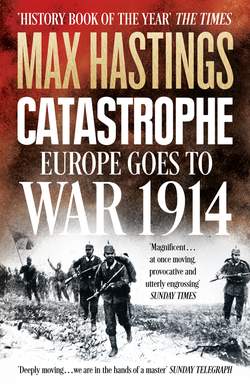Catastrophe: Europe Goes to War 1914

Реклама. ООО «ЛитРес», ИНН: 7719571260.
Отрывок из книги
‘Hastings is a brilliant guide to that strange, febrile twilight before Europe plunged into darkness. Writing in pungent prose suffused with irony and underpinned by a strong sense of moral outrage, Catastrophe is a frontal assault on what Hastings calls the “poets’ view” of the First World War. Hastings is crisp, and definitive on the balance of guilt … Scholarly and fluent, relating with equal verve the attitudes and experiences of crowned heads and peasants … for anyone wanting to understand how that ghastly, much-misunderstood conflict came about, there could be no better place to start than this fine book’
BEN MACINTYRE, The Times
.....
Both sides’ commanders grossly underrated their opponents. Elaborate rival plans for mobilisation and deployment were not the cause of conflict in 1914, but the Great Powers might have been much less willing for war had their soldiers recognised the fundamental weakness of their offensive doctrine. All the nations’ assessments were critically influenced by Japanese successes in attack in 1905, against Russian machine-guns. They concluded that this experience demonstrated that if the spirit was sufficiently exalted, it could prevail against modern technology.
Enthusiastic British patriots, in the early summer of 1914, were looking forward to a commemoration the following June of the centenary of the Battle of Waterloo: they proposed to make the occasion a celebration of the fact that for a hundred years no British army had shed blood in western Europe. Nonetheless, cautious contingency plans were in place to do so again. The British and French armies had begun staff talks in 1906, and Britain signed an agreement with Russia the following year. The Russians, however, saw reason to question their new friend’s good faith when in 1912 a British shipyard began building for the Turks two battleships, which represented a mortal threat to the Tsar’s dominance of the Black Sea. Challenged by St Petersburg, the Foreign Office responded blithely that it could not interfere with private commercial contracts. A British naval mission was meanwhile aiding the Turkish fleet, at the same time as Liman von Sanders trained the Turkish army.
.....